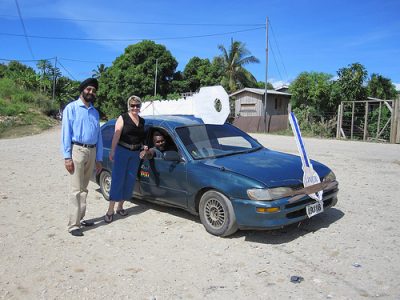Mr Philip plans to introduce a ‘forgiveness bill’ aimed at doing just that. The loose coalition he will lead includes a casino operator, local businessmen and former members of the Malaita Eagle Forces (MEF) militia. The most notorious of the MEF’s leaders, Jimmy ‘Rasta’ Lusibaea, was released from prison only in 2007. Lusibaea served a four-year term for crimes committed during the so-called ‘tension’ years of 1998-2003, when the fighters of MEF did battle with adversaries from the island of Guadalcanal. Rasta is now the newly elected MP for North Malaita, and a member of the new prime minister’s coalition. If this is the face of governance to come, Australia and its comrades in RAMSI cannot be encouraged at what their good works have wrought.
Mr Philip was chosen by a secret ballot cast by 50 MPs on August 25th. The MPs were themselves elected on August 4th. Half of them are newcomers to parliament (as is often the case in the Solomon Islands) and their allegiance to political parties is thin.
The parliamentary election itself was reasonably well-administered and trouble-free. The supporters of losing candidates vented their frustrations on a counting centre at Auki, on Malaita and against the shops and residences of victors on a couple of other islands. And on 12th August, some post-election revelry turned deadly. When a party in a village outside the capital, Honiara, degenerated into stone throwing, Tongan soldiers serving with RAMSI responded with live fire. They injured one man and killed another. Astonishingly, this was the first civilian fatality inflicted in the line of duty by RAMSI forces in the seven years since their mission started.
Once elected, the 50 MPs descended on Honiara to pick a prime minister. This is the period in which the ‘big men’ court the new MPs with promises of ministerial portfolios, control of state-owned enterprises and cash (to be itemised as a ‘refund of campaign expenditures’). Much is at stake in this stage of the contest. In 2006, the outcome of another prime-ministerial election provoked riots in Honiara: the Chinatown district was burned down and RAMSI vehicles and personnel were attacked.
As they had in 2006, politicians again based their rival camps at Honiara’s plush hotels, with Mr Philip at the Pacific Casino Hotel, and his opponent Steve Abana of the Solomon Islands Democratic Party (SIDP) at the newly built Heritage Park Hotel. Derek Sikua, the most recent prime minister, stood aside to allow Mr Abana to contest on behalf of the Heritage Park camp. Fissures emerged within the group as other rivals to Mr Abana struggled for the nomination; these divisions probably cost him the election. Unlike 2006, however, the post-election scene in Honiara remained calm.
Prior to the election, Dr Sikua’s government had attempted to pass legislation to strengthen the political parties and straighten out the electoral process. The bill was defeated by several ministers in Dr Sikua’s cabinet, who were subsequently sacked. Most of these ministers ended up in the Pacific Casino camp, backing Mr Philip. As it happened, the intra and inter party wrangling was so fractious that the proposed legislation would have made little difference to the outcome. Dr Sikua’s government splintered and begat several new parties ahead of the polls, and some of the SIDP politicians are known to have secretly switched sides in the voting, enabling Mr Philip to eke out a majority of 26 votes to 23 (with one spoiled ballot).
Mr Philip is a politician groomed under the leadership of Solomon Mamaloni, three times the prime minister in the 1980s and 1990s. Mr Mamaloni perfected a style of Melanesian politics which involves much wheeling and dealing, keeping close links with Asian logging companies, and staying ever ready to throw together new coalitions to head off the threat of no-confidence motions, ever a bane to the region’s governments. Mr Mamaloni’s style was practiced diligently by Sir Allen Kemakeza, the prime minister from 2001 to 2006, and it is likely to characterise Mr Philip’s prime ministership too.
All this will not be music to the ears of RAMSI’s special co-ordinator, Graeme Wilson. Relations had warmed under Dr Sikua’s government, after a troubled period during 2006-07, when a government hostile to RAMSI turfed out Australia’s high commissioner and an Australian police chief. But now those politicians closest to Australia are back in opposition. Mr Philip says he will not expel RAMSI. But his promise to review its mission, yet again, will sound alarm bells at the sprawling RAMSI base near Honiara’s international airport. In February New Zealand’s foreign minister, Murray McCully, indicated that he would like to see RAMSI wound down in favour of bilateral programmes. Mr Philip’s election is likely to reinforce that resolve, in both New Zealand and Australia.
Dr Jon Fraenkel is a Senior Fellow, State, Society & Governance in Melanesia Program (SSGM), at the School of International, Political & Strategic Studies at the Australian National University. He was a supervisor at the recent election in the Solomon Islands.
This article was originally posted here at The Economist. It has been republished with the permission of the Economist. Further reproduction is prohibited and any enquiries should be directed to the rights department of the Economist.

